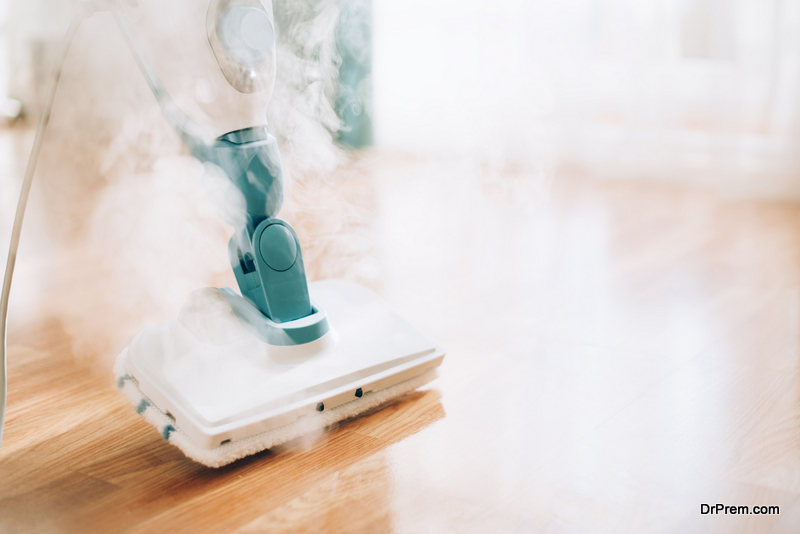The dreaded coronavirus has brought into focus the importance of cleanliness and hygiene. There are many solutions which claim to rid the surfaces of your home but they are chock full of chemicals which are quite toxic. On the other hand, there are ways to clean your home naturally. You can make some disinfecting solutions, as well as buy natural cleaning solutions. There is a method to disinfect your home too. Check out the ways to disinfect your house naturally.
Guide to disinfect your house naturally
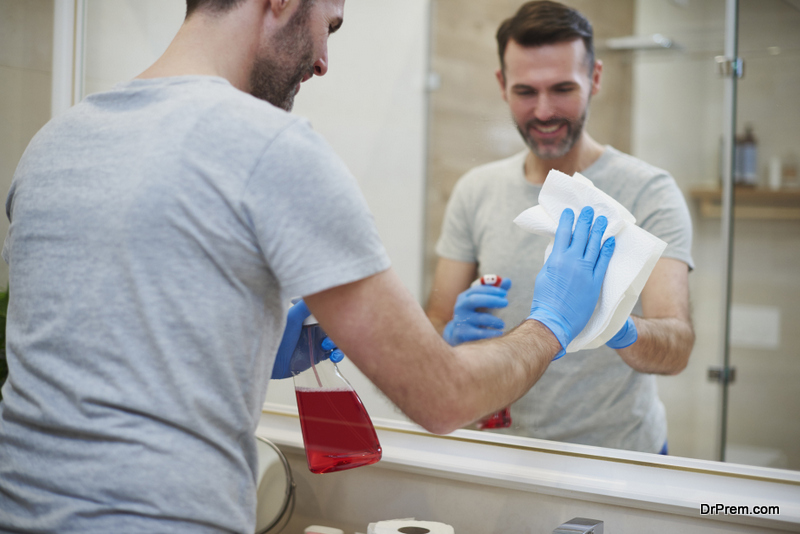 Every year, there is a new virus which hits humanity, leaving all reeling. Or a bacterial infection which is tough and resistant to drugs. To keep yourself and your family safe, you have to keep the surfaces of your home – the floors, counters, tables, furniture and other metallic surfaces clean.
Every year, there is a new virus which hits humanity, leaving all reeling. Or a bacterial infection which is tough and resistant to drugs. To keep yourself and your family safe, you have to keep the surfaces of your home – the floors, counters, tables, furniture and other metallic surfaces clean.
Did you know that bacteria can live without a host (a body like yours), but viruses cannot survive without a host, or rather a body? Though bacteria can survive without you, once you have a bacterial infection, it can be treated by antibiotics.
But once a virus enters your body, it is very difficult to treat, as there are very few antivirals available, and that too, only for a few known viral infections. But, viruses cannot survive very long without a host, so if surfaces are cleaned, and if you keep washing your hands, you can hope to be safe!
If you keep cleaning all the surfaces with natural disinfectants, which are effective, you would be able to keep your family safe from deadly germs.
How to start the cleaning process
Before you apply your solution, you should clean with a dry cloth perhaps a microfiber cloth to remove any dirt as well as residue from surfaces. Then you should spray the surfaces with a disinfectant. Don’t rub off the disinfectant for at least 2 minutes.
Which are the surfaces you should disinfect
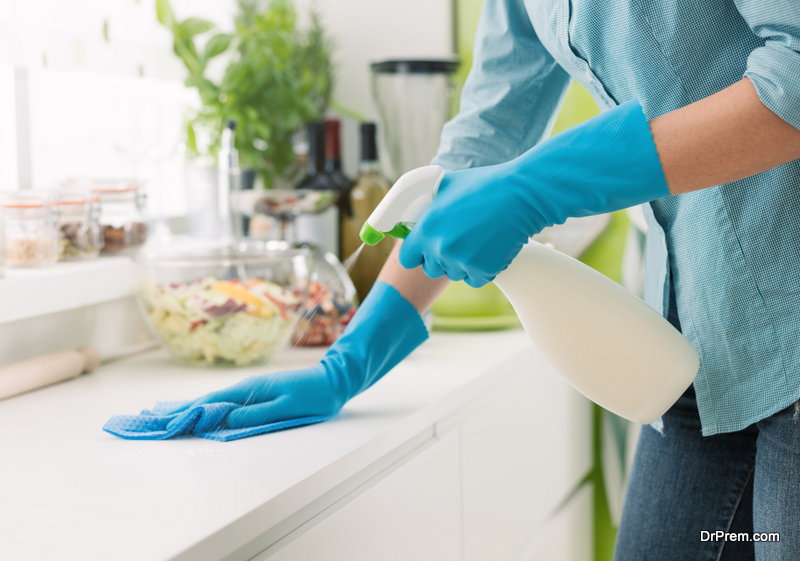 The floors, counters, furniture and other surfaces in your home are the usual places where you regularly clean. However, to be on the safe days in these days of deadly viruses, there are some other things in the home you should clean every day with alcohol disinfects or sanitizers.
The floors, counters, furniture and other surfaces in your home are the usual places where you regularly clean. However, to be on the safe days in these days of deadly viruses, there are some other things in the home you should clean every day with alcohol disinfects or sanitizers.
These are light switches, faucets, door handles, toilet handles, stair handrails, toilet seats, telephones, laptops, remote controls, car door handles and steering wheel, and the exterior door handles. Plus, any surface you touch regularly, such as watering cans and so on.
What is the disinfectant that is best for you?
The disinfectants which have a pH value close to 7 or are more neutral are advisable. This is because they will reduce risk of skin and eye irritation, if they touch your skin. Do not use a solution of disinfectant which is of a higher concentration than is recommended. It would be a waste of product, which will be a waste of money, cause skin irritation and also be harmful for the environment.
It is best to use natural disinfectants, which are free of chlorine to eliminate risks. The product should have ‘chlorine-free’ printed on the label. Never use more than one product at one time, and rinse all the surfaces thoroughly.
Look for non-toxic cleaners which are marked ‘green’, and do not contain chlorine, triclosan, triclocarbon, glycol ethers, ammonia, or alcohol. Choose products which say ‘petroleum-free’, ‘phosphate free’, ‘90% biodegradable’, ‘solvent free’ and ‘VOC free’.
Use an old toothbrush in order to scrub counters and tile corners.
Here is a list of some natural ways/solutions to disinfect the home:
1. Citric acid
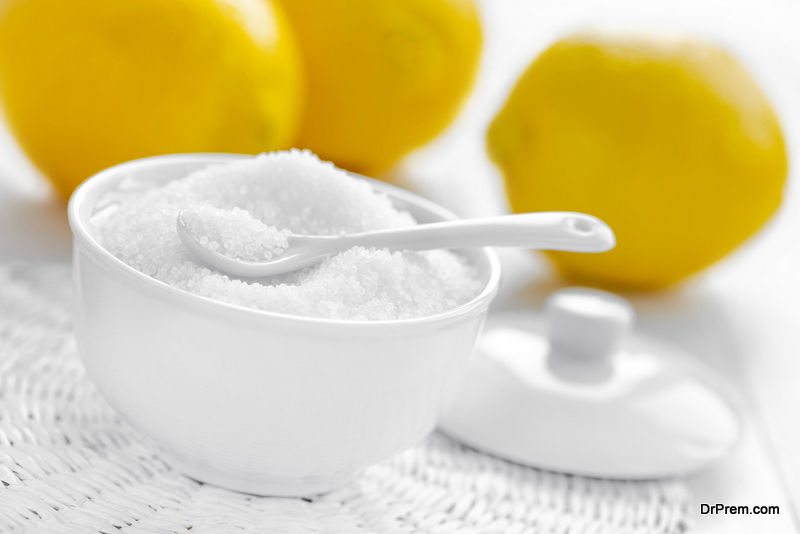 One of the most eco-friendly ways of killing germs is making a solution from citric acid that can be derived easily from lemons. The juice of a lemon works best when added to white vinegar. It smells really good too. All you have to do is add ¼ part lemon juice, 1 part water and 1 part of white vinegar.
One of the most eco-friendly ways of killing germs is making a solution from citric acid that can be derived easily from lemons. The juice of a lemon works best when added to white vinegar. It smells really good too. All you have to do is add ¼ part lemon juice, 1 part water and 1 part of white vinegar.
This is a very effective cleanser, which is made only of non-toxic ingredients and you can make it in a jiffy whenever you want to clean. Mix some borax, about two tablespoons to make your disinfectant even better. Use warm water bit it should not be too hot. After the borax is dissolved in water, add lemon juice and put it in a spray bottle. In case, you like citric acid too much, you can even make a detergent out of it.
2. Steam Cleaner
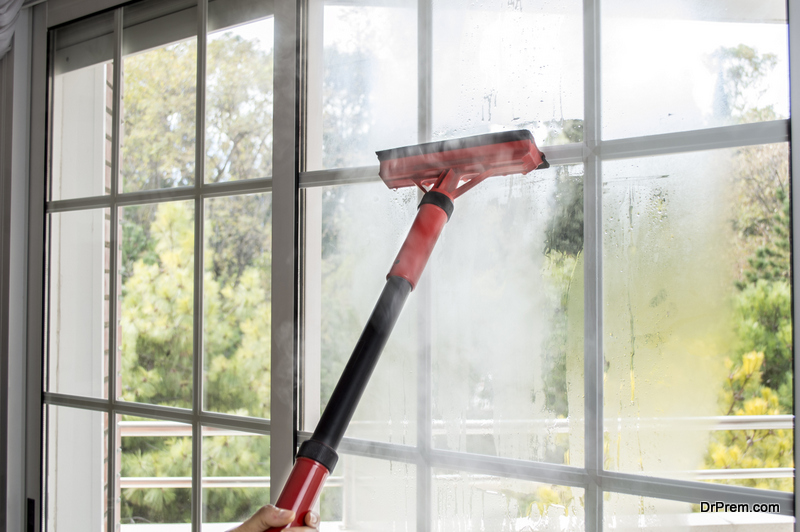 Steam Cleaners are one of the most eco-friendly ways of killing germs. They are not very popular these days, but they should be, as they clean very effectively without any chemicals, and so they are excellent and the top choice. You need only water for steam cleaning.
Steam Cleaners are one of the most eco-friendly ways of killing germs. They are not very popular these days, but they should be, as they clean very effectively without any chemicals, and so they are excellent and the top choice. You need only water for steam cleaning.
It does not irritate the skin and lungs. It is safer for pets and children as well, provided they stay well away from the steam, which is extremely hot and dangerous. Usually, steam cleaners come with accessories such as hairbrushes, toothbrushes etc. to help clean food preparation areas, corners and so on.
This option for eco-friendly cleaning has temperature as the primary agent which influences germ fighting abilities. The system should heat up to about 250 degrees F to be effective.
After using steam, you could use a natural disinfectant if you want, to protect the health of your family.
3. White vinegar
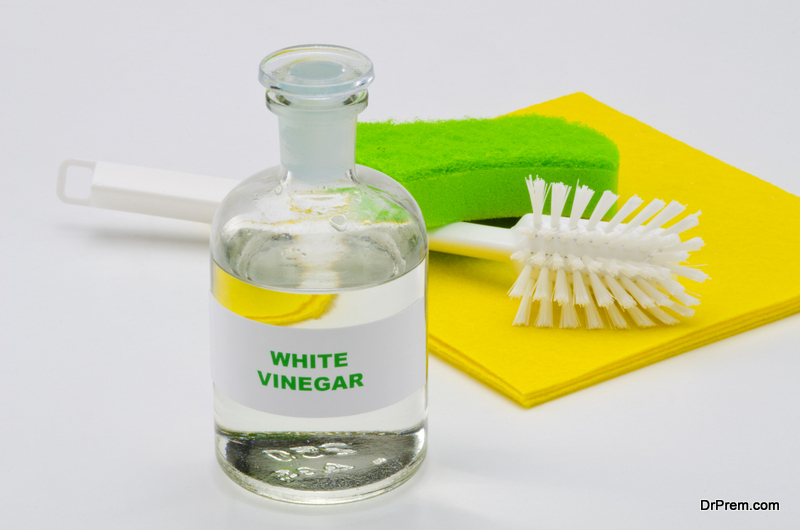 This is one of the ways to clean your home sustainably. White, distilled vinegar is a good way to clean windows, mildew and mold, as well as soap scum. You can use it to sanitize the counters of the kitchen before cutting or chopping vegetables on it.
This is one of the ways to clean your home sustainably. White, distilled vinegar is a good way to clean windows, mildew and mold, as well as soap scum. You can use it to sanitize the counters of the kitchen before cutting or chopping vegetables on it.
Make a vinegar spray with 1 part vinegar, 1 part water and only a few drops (5-15 drops) 100% essential oil. Use any essential oil, but for the kitchen you might use lemon as it is fresh and strong enough to overcome the strong smells of the kitchen. Eucalyptus and Tea Tree essential oils are also great for neutralizing bathroom odors.
You can also use white vinegar to make DIY orange cleaner, which is as wonderful as it sounds.
For parts of the home where there is no strong smell to get rid of, you can mix vanilla or chamomile to make the rooms have a sweet scent.
4. Make some disinfectant wipes
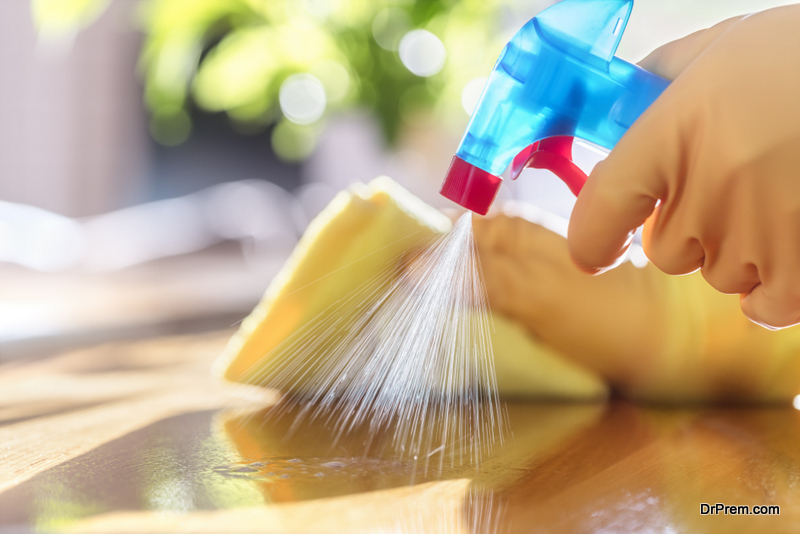 For cleaning your home sustainably, you can make wipes instead of a spray. The ingredients are the same as vinegar spray as mentioned above. Put all the ingredients in a glass jar which is large in size. Then put in some cloth pieces, around 15-20 pieces of 10 inch or 25.4 cm size, and place inside the cleaner jar.
For cleaning your home sustainably, you can make wipes instead of a spray. The ingredients are the same as vinegar spray as mentioned above. Put all the ingredients in a glass jar which is large in size. Then put in some cloth pieces, around 15-20 pieces of 10 inch or 25.4 cm size, and place inside the cleaner jar.
Press the cloths down inside, so that they are completely submerged, and soak the vinegar disinfectant. Close the jar and place the store the wipes in pantry or cupboard.
Whenever you want to use your homemade wipes, wring it and remove the excess cleaner and use it to wipe down the surfaces.
5. Hydrogen Peroxide
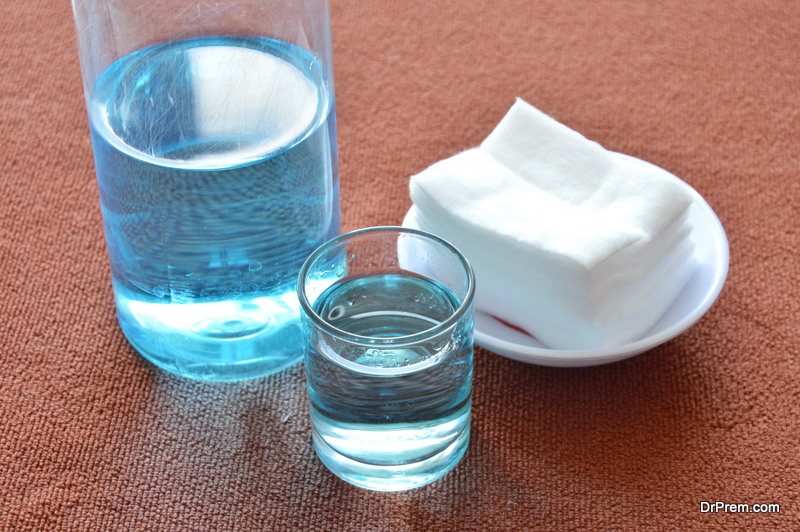 Hydrogen peroxide is a safe disinfectant to clean homes. Hydrogen peroxide is used to clean messes made by pets, get rugs to smell fresh, disinfect the kitchen and the germs in bathrooms.
Hydrogen peroxide is a safe disinfectant to clean homes. Hydrogen peroxide is used to clean messes made by pets, get rugs to smell fresh, disinfect the kitchen and the germs in bathrooms.
A word of caution: Do not mix hydrogen peroxide and vinegar (as many recipes show online), which creates peracetic acid, and is not a safe enough disinfectant to use at home. Both vinegar and hydrogen peroxide are great separately but dangerous when mixed.
After spraying with vinegar solution, you can spray with hydrogen peroxide to give a solid punch to the germs.
To clean pet messes, after cleaning up the mess, spray Hydrogen peroxide and let it sit and then soak it up.
To make a hydrogen peroxide solution: Mix one part of water with one part of hydrogen peroxide and mix them together in spray bottle. Spray onto hard surfaces, and allow to sit for about 2 minutes and wipe the excess off.
6. Soap and water
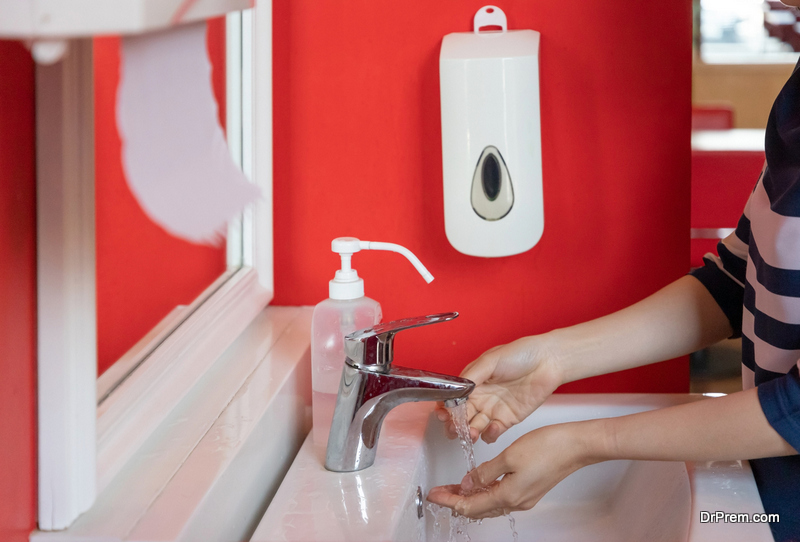 WHO and CDC have recommended to clean your hands every time you go out, and come back home. In fact, before entering your home, clean your hands with an alcohol hand sanitizer before touching your doorknob. Then, after entering your home, wash your hands with soap and water.
WHO and CDC have recommended to clean your hands every time you go out, and come back home. In fact, before entering your home, clean your hands with an alcohol hand sanitizer before touching your doorknob. Then, after entering your home, wash your hands with soap and water.
You don’t have to buy the expensive or attractive ones which claim to have antimicrobial properties. All soaps are equally effective, and experts actually advise against using antibacterial products, as most of them contain triclosan, which research suggests to be an endocrine disruptor. And overuse of antibacterial products may contribute to the rise of superbugs.
Buy cleaning products which are certified by EPA
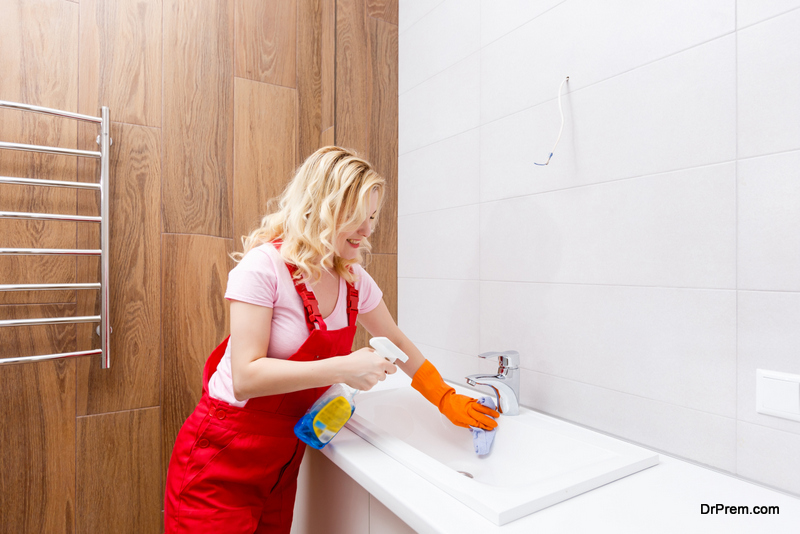 The Safer Choice Program of the EPA screens products which signifies that a product has a reduced impact on the environment, even though it has the required potency for the disinfection.
The Safer Choice Program of the EPA screens products which signifies that a product has a reduced impact on the environment, even though it has the required potency for the disinfection.
Acetic acid, citric acid, hydrogen peroxide and other non-toxic ingredients are the active ingredients which are used to manufacture these eco-friendly cleaners. You can even buy readymade cleaning products which claim to have similar eco-friendly constituents. Not only in homes, but these solutions are being used in medical, educational and commercial institutions and other facilities.


